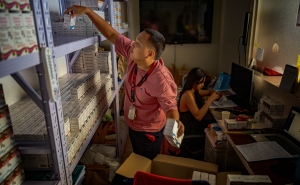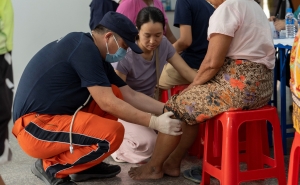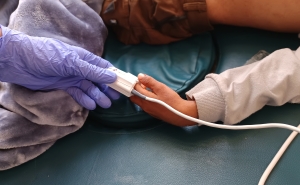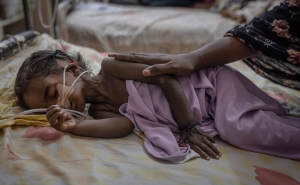Cholera – How to Better Identify, Track and Prevent It
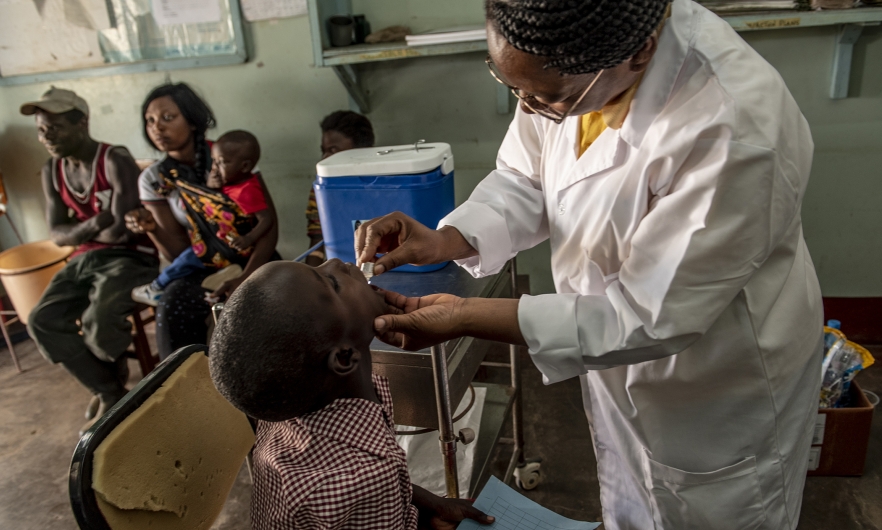
A health worker administers oral cholera vaccine to a child in Zambia. Photo credit: Karen Kasmauski
The Department of International Health at the Bloomberg School has been a leader in cholera prevention for more than 35 years and since 2014 has hosted the Stop Cholera website, which provides tools and resources to countries and agencies dealing with the threat of cholera. Three projects led by Amanda Debes and David Sack are helping low- and middle-income countries identify and slow the disease's transmission. Project researchers are also contributing to local capacity that will help ultimately eliminate the disease, which currently is estimated to infect 2.86 million while killing about 95,000 people a year.
The Rise Project—using rapid diagnostic tests to improve the effective use of the oral cholera vaccine
The “Rise Project,” (Rapid Diagnostic Test Implementation Strategy and Evaluation) evaluates how the cholera rapid diagnostic test (RDT) can improve surveillance to improve the ability to focus interventions, such as deploying the vaccine, and make them more effective. The RDT is a relatively new test (but is similar to a pregnancy test) and presents a new opportunity to improve surveillance, especially in remote areas where microbial culture (the old standard method) is not feasible. While RDTs are promising, there are issues around their use which must be understood for optimization. As with any new technology, the users must understand when and where to use the test, how to interpret the test, and how to deal with uncertainties. Occasionally, false positives and false negatives may occur. There are additional methods to confirm the results, but users need to understand when these confirmation procedures are warranted. GAVI, which funds the project, has now established an opportunity for ministries of health to apply for and receive RDTs for their national cholera control program. The Rise Project, which is based in Nepal, will provide guidance for the use of RDTs as they become more widely used. The project is a collaboration with the International Vaccine Institute in Seoul, Korea; GTA (Group for Technical Assistance, an NGO based in Nepal; and the Nepal Ministry of Health and Population.
Chol-Gen Project—enhancing cholera genomic surveillance and capacity in Africa
“Chol-Gen project” (Cholera Genomics), a collaboration with the African Centres for Disease Control and Harvard University builds capacity for cholera genomics in five countries in sub-Saharan Africa: Cameroon, the Democratic Republic of the Congo, Mozambique, Nigeria, and Uganda. Bacterial genomics is a powerful new tool to identify and characterize different genetic lineages. This information allows researchers to better understand how these lineages are transmitted through populations and even possibly through sources of water such as rivers and sewage systems. The project helps build national laboratory capacity in the five countries and trains local researchers to analyze the data using bioinformatics. The project is funded by the Bill & Melinda Gates Foundation.
Epidemiology and Ecology of Cholera in Africa
The Epidemiology and Ecology of Cholera in Africa project utilizes many of the same tools as the two above to better understand transmission, the effectiveness of vaccines, and the role of potential environmental reservoirs. This project, however, focuses more directly on the control of cholera in Africa and monitoring transmission patterns. It also aims to gain a better understanding of how it spreads across national and local borders. The research is guided by the Goals of the Global Task Force on Cholera Control to eliminate cholera from at least 20 countries by 2030. Project researchers have developed the Cholera Elimination Scorecard to help countries monitor progress toward this goal. The use of the scorecard is already showing impressive results toward cholera elimination in Uganda and it will be evaluated in other African countries to assist countries monitor progress and focus resources. The project is funded by an RO1 grant from NIH and is a collaboration with the University of Florida, the Nigeria CDC, and Makerere University in Uganda.
Other faculty and student researchers involved with the three projects:
The Rise Project: Camille Williams, Melissa A. Marx, Erica Rosser, Helen Kuo, Kendra Williams, Erin Baumgartner
Chol-Gen Project—enhancing cholera genomic surveillance and capacity in Africa: Moise Ngwa, Camille Williams, in collaboration with Shirlee Wohl and Nate Matteson at Harvard.
Epidemiology and Ecology of Cholera in Africa: Moise Ngwa, Camille Williams
Other IH faculty leading cholera-related projects include Christine Marie George and Subhra Chakraborty.


